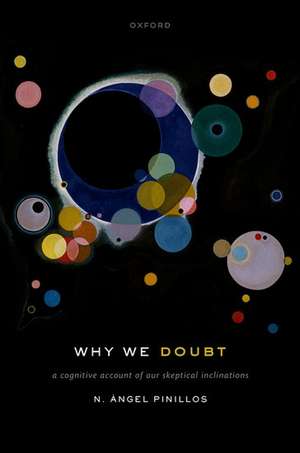Why We Doubt: A Cognitive Account of Our Skeptical Inclinations
Autor N. Ángel Pinillosen Limba Engleză Hardback – 22 aug 2023
Preț: 451.69 lei
Preț vechi: 622.18 lei
-27% Nou
Puncte Express: 678
Preț estimativ în valută:
86.44€ • 93.86$ • 72.61£
86.44€ • 93.86$ • 72.61£
Carte disponibilă
Livrare economică 21-27 martie
Livrare express 18-22 martie pentru 111.74 lei
Preluare comenzi: 021 569.72.76
Specificații
ISBN-13: 9780198871965
ISBN-10: 0198871961
Pagini: 304
Dimensiuni: 164 x 242 x 22 mm
Greutate: 0.62 kg
Editura: OUP OXFORD
Colecția OUP Oxford
Locul publicării:Oxford, United Kingdom
ISBN-10: 0198871961
Pagini: 304
Dimensiuni: 164 x 242 x 22 mm
Greutate: 0.62 kg
Editura: OUP OXFORD
Colecția OUP Oxford
Locul publicării:Oxford, United Kingdom
Recenzii
Pinillos gets serious about skeptical doubt as a psychological phenomenon, offering us a cognitive-scientific account of where it comes from... The book is a major contribution to empirically informed epistemology and a model for how to bring cognitive science to bear on traditional philosophical issues.
This [is a] really excellent monograph. I learned a ton from this book. It is remarkably deeply and broadly researched and meticulously argued. It covers so much ground-in both cognitive science and epistemology...
Why We Doubt (OUP, 2023) is a great book. Crystal clear, meticulous, immersed in empirical and philosophical literature and full of argument and insight, it is a paradigm of excellent philosophical work. It is a must read for anyone interested in the theory of knowledge and related topics, such as the cognitive psychology of doubt, belief and knowledge. The book provides a cognitive, computational explanation of doubt in human cognition and then utilizes these mechanics of doubt to understand various doubt-related epistemic phenomena: skepticism in its various forms, its (dis)value, obsessive compulsive disorder (OCD), conspiracy theories, relevant alternatives theory and more. He even draws from neuroscientific results to suggest a location of the brain circuitry that physically realizes skeptical inclinations.
It really engages in far-flung excursions into creativity, conspiracies, judicial systems, and even neuropathology. Recommended.
the book is a significant contribution to philosophical discussions of skepticism, particularly in its innovative and comprehensive approach to addressing global skepticism...His integration of the cognitive sciences with epistemology not only enriches our understanding of skeptical inclinations but also challenges us to consider more nuanced models and gather more empirical data to robustly tackle skepticism, even its more global forms. As we advance, it is crucial to build on Pinillos' insights, exploring the depth and breadth of skeptical challenges and responses, ensuring a dynamic and evolving conversation within the philosophical community and beyond. This engagement not only refines our theoretical perspectives but also enhances our practical understanding of knowledge, belief, and justification in the face of skepticism.
This [is a] really excellent monograph. I learned a ton from this book. It is remarkably deeply and broadly researched and meticulously argued. It covers so much ground-in both cognitive science and epistemology...
Why We Doubt (OUP, 2023) is a great book. Crystal clear, meticulous, immersed in empirical and philosophical literature and full of argument and insight, it is a paradigm of excellent philosophical work. It is a must read for anyone interested in the theory of knowledge and related topics, such as the cognitive psychology of doubt, belief and knowledge. The book provides a cognitive, computational explanation of doubt in human cognition and then utilizes these mechanics of doubt to understand various doubt-related epistemic phenomena: skepticism in its various forms, its (dis)value, obsessive compulsive disorder (OCD), conspiracy theories, relevant alternatives theory and more. He even draws from neuroscientific results to suggest a location of the brain circuitry that physically realizes skeptical inclinations.
It really engages in far-flung excursions into creativity, conspiracies, judicial systems, and even neuropathology. Recommended.
the book is a significant contribution to philosophical discussions of skepticism, particularly in its innovative and comprehensive approach to addressing global skepticism...His integration of the cognitive sciences with epistemology not only enriches our understanding of skeptical inclinations but also challenges us to consider more nuanced models and gather more empirical data to robustly tackle skepticism, even its more global forms. As we advance, it is crucial to build on Pinillos' insights, exploring the depth and breadth of skeptical challenges and responses, ensuring a dynamic and evolving conversation within the philosophical community and beyond. This engagement not only refines our theoretical perspectives but also enhances our practical understanding of knowledge, belief, and justification in the face of skepticism.
Notă biografică
N. Ángel Pinillos is an Associate Professor of Philosophy at Arizona State University in Tempe, AZ. He earned a BS in Mathematics from Tufts University and a PhD in Philosophy from Rutgers University. He has authored numerous scholarly articles on cognitive science and epistemology as well as on the philosophy of language. Pinillos has presented his work in over a dozen countries and has also written for public venues, including the New York Times.
